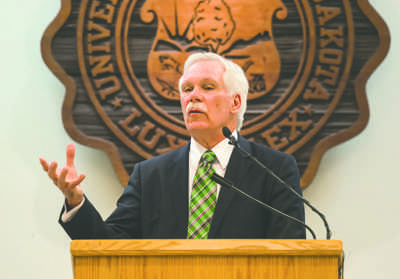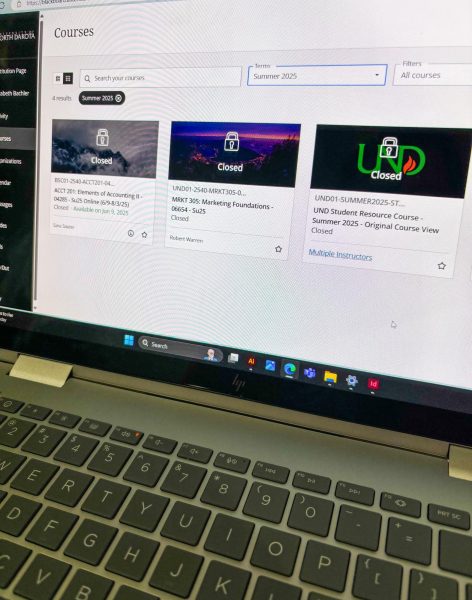UND responds to budget decisions
Interim President Ed Schafer addresses the crowd during the budget forum Wednesday afternoon in the Memorial Union. Photo by Nick Nelson/The Dakota Student
Tears were shed, grievances were heard and questions were asked about the rationale behind UND’s proposed budget cuts.
Hundreds of people flocked to the Memorial Union Ballroom to take part in a public forum regarding the recent budget proposals.
Interim UND President Ed Schafer opened the forum with a brief speech about the budget process, noting that the he is trying to position the university for future success through this reshaping of the budget.
“While we are talking about cuts today and changes in budget and difficulties that we are going through right now, we are also making investments in the future of the university,” Schafer said.
Many in the audience voiced opposition to the way the process has been handled and decisions that have been made, including the suspension of the music therapy program.
“It seemed that the administration had said the cuts will be coming from the departmental level,” said Jace Erikson, a senior studying music education. “However, many cuts across campus seem to have been coming from the administration from the top down.”
Erikson, along with other supporters of the music therapy program, argued that the music therapy does not cost the university money because the program breaks even after considering the tuition and fees paid by the students in the program.
Michael Gallo, a professor at UND, tearfully told Schafer of the positive impact music therapy had on his wife, who has Alzheimer’s.
One of the most applauded speeches of the day was given by Jim Whitehead, professor of kinesiology and public health education at UND.
“It seems to me the bulk of the cutting has come from academic programs, instructors, faculty and lower level support,” he said. “I don’t see any significant exam of the need for upper level administration. For some time, I’ve asked for specific examination of every assistant associate dean VP position with a justification of why we need those.”
Whitehead continued to say there may well be a justification for these positions, but more cost-effective and efficient staffing methods might be found.
Jacob Notterman, UND freshman and Studio One intern, spoke on behalf of Studio One, which has been slated for closure.
“We will not only be patient for Studio One’s return, but we wish to and will also play a role in that return, and in doing so, we would like to see a more emphasis on the academic mission of the Television Center so we are able to rebuild as quickly as possible,” Notterman said.
In a Facebook post on Studio One’s page early this week, Television Center director Barry Brode wrote that while Studio One will be discontinued next year, the center is in the process of determining what the future of the department will be.
Brett DeGagne’, senior and member of the UND baseball team, questioned Schafer on why the program was cut without the opportunity to be suspended or raise money. Additionally, he said that UND baseball had brought national attention to the university through its wins against USC, then the No. 12 team in the country.
Schafer responded there were ongoing discussions on how to save the baseball the team, but stressed that there must be a sustainable source for funding if the program is to continue.
Earlier in the forum, Schafer said he thought UND should have a campus-wide discussion about the future of UND athletics and the number of teams at the university, noting UND had 19 total sports teams to NDSU’s 14.
“Just think of the money if we drop the number of teams that will be generated again on that focus of excellence,” Schafer said.
When asked about the use of a tuition increase to fund more spending at UND, Schafer said that he had no desire to increase tuition at UND. He noted that many universities throughout the country increase tuition as a funding mechanism to expand programs.
“It fell to the back of students on increased tuition,” Schafer said. “And the result of that is students graduating with debt that is unimagineable and hard to even consider the next 20 years paying it off after they get out of school.”
Sandi Kruse, a junior at UND, questioned the reasoning behind certain cuts in the College of Arts and Sciences.
“For example, women and gender studies, an extremely cost -effective program, has received a 21 percent cut,” Kruse said. “American Indian studies will receive a 15 percent cut, but other programs with much larger budgets, smaller classes and no majors and minors will see a one or two percent cut.”
Schafer responded that certain percentage of funding cuts may not reflect the other policies being implemented in certain departments in an attempt to improve the program.
“If you dig into it, what I’m hoping to show you is that we will focus on making that unit better,” Schafer said, in reference to Kruse’s concern regarding the women and gender studies program.
This theme of restructuring and improvement was stressed by Schafer throughout the forum.
“I am absolutely convinced and want to lend you my confidence, that when we get through this difficult time, a new University of North Dakota will emerge,” Schafer said, referencing his time as governor of North Dakota during budget difficulties that was followed by an economic expansion as an example.
Many additional concerns were raised throughout the forum, including the suspension of the American Sign Language minor, faculty and staff being laid off and the closure of the One Stop Shop.
Sean is the editor-in-chief for The Dakota Student. He can be reached at sean.d.cleary@und.edu








